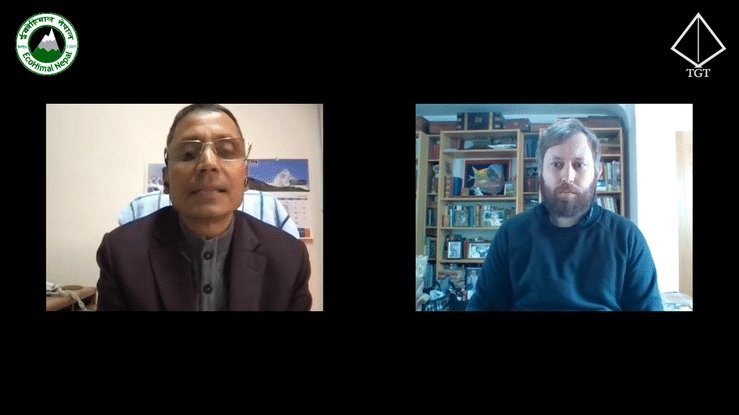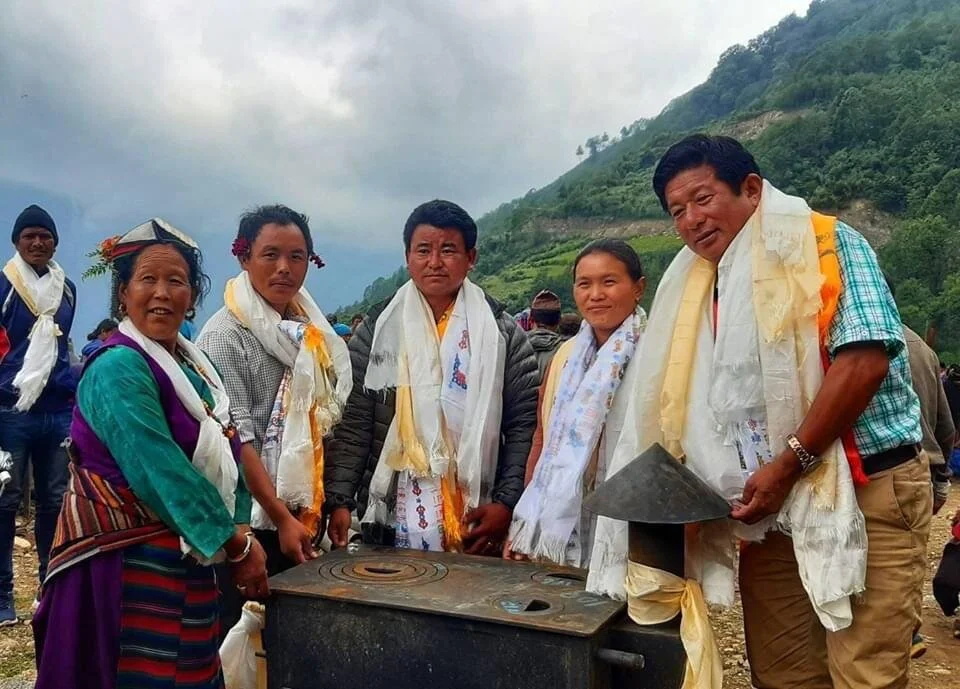Last month our NGO partners in Nawalparasi, HICODEF, organised a field trip for farmers in involved in our ‘Layer Farming for Adaptation’ project. These farmers are learning how to grow and - as importantly - process, market and sell coffee as a sustainable development and climate change adaptation strategy.
Webinar: Climate Change Adaptation Nepal
EVENT: 10am (GMT) Feb 6th
Join Narayan Dhakhal (EcoHimal) and Dr. Morgan Phillips (The Glacier Trust) for a conversation on their climate adaptation work in Nepal.
This 90 minute event is an opportunity to hear first hand from EcoHimal's Executive Director, Narayan Dhakhal who will have just returned from monitoring and delivering our joint projects in Kavrepalanchok, Sankhuwashabha and Solukhumbu.
Narayan and TGT Co-Director, Dr. Morgan Phillips, will reflect on the roll of agro forestry in climate change adaptation; and the success of the community-led Deusa Agro Forestry Resource Centre and how it is now being replicated and scaled up in new locations.
Narayan will report on all the latest developments, with exciting news of new project work starting in Khotang.
There will be time to ask questions about the impacts of climate change in Nepal, what can be done to enable people to adapt to its impacts, the impacts of the COVID-19 pandemic on our project work; and our future plans.
A Returnee Migrant's Story
We have lost a great friend. RIP Mr. Surbir Sthapit
It is with huge sadness that we report the loss of our dear friend and colleague Mr. Surbir Sthapit, Executive Director and founding member of HICODEF, who died yesterday (October 20th, 2020) from COVID-19, aged just 53.
Surbir Sthapit in his office during our last monitoring visit, Oct. 2019.
He is survived by his wife and two sons. Our thoughts are with them, Surbir’s wider family, his friends, and everyone at HICODEF.
HICODEF has been one of The Glacier Trust’s longest standing NGO partners in Nepal and Surbir has been the driving force behind the innovative and highly effective projects we have worked on together for nearly a decade.
We are devastated to have lost Surbir from the TGT family. He has changed attitudes, lives and life chances of so many people, enabling them to adapt to the impacts of climate change, recover from earthquakes and to develop the prosperity and health of their land, villages and communities. He was a true changemaker.
We will remember him fondly and with the deepest feelings of love and respect.
We will miss you Surbir ji.
Excitement for Bisne Rana
This case study was sent to us as an appendix to HICODEF’s first annual report on the Layer Farming for Adaptation project. We have done some light editing to the text, but have not do a full re-write as the meaning comes across perfectly. The full annual report can be downloaded from our reports page.
Bishne Rana, 46, is a resident farmer of Ripaha village. He lives there with six family members. He migrated to gulf country for labour and returned two years ago. After returning home he re-continued his traditional farming occupation. He cultivated maize, millet, rice and vegetables. By this farming practice he and his family only coped with difficulty; year round food security was a problem.
The Layer Farming for Adaptation project gave him the chance to become a founder member of the farmer's group the project established in Ripaha. Furthermore, he got the opportunity to get involved in framers group training and received onsite technical support from our project staff. After being trained he started farming vegetables like chili, long beans and tomato.
Having seen his efforts and commitment, the project supported him with a polytunnel and a 1,000 litre irrigation tank. After that he started tomato farming in the tunnel. In the lockdown period and since, he has grown 400kg of tomato.
Unfortunately, due to lockdown he could not get a high price for his tomato crop. However, he did manage to sell it at Rs 20/kg* and earned more than 8,000 rupees from. Likewise, he sold 100kg long beans at Rs 80/kg and earned a further 8,000 rupees.
In the last month or so, he has started to grow valuable chillies named Akbare on one ropani of land, which is now ready to sell. These chillies can be sold for Rs 200/kg in the local market, possibly more.
Bisne Rana is very excited by his success so far, he told us: "I will expand my vegetable farming in more than 5 Ropani and will take more than 1 lakh (100,000 rupees) every year." Now he has also started coffee plantation on his land too; he will be supported in growing and commercialising organic coffee using the layer farming method.
*Tomatoes can normally fetch up to Rs 40/kg in local markets (around 25p)
To find out more about our Layer Farming for Adaptation work, please visit our projects pages. This project is 100% funded by TGT’s individual supporters, please make a donation to help us to expand and continue this work.
Vegetable price hikes emphasise importance of our work
Nepal is currently in the midst of multiple overlapping crises and challenges. The exceptionally heavy monsoon rains have taken a terrible toll, 101 people have died and a further 53 are missing. Coronavirus cases continue to emerge, 18,374 positive cases have now been recorded, with a total of 44 deaths. Lockdown restrictions are easing slowly, but the economic fallout promises to be severe. An emerging, fourth, challenge is developing in the south of the country on the Terai, but it is one that The Glacier Trust is playing a role in easing.
Keshab Rai, Deusa AFRC’s manager distributes fruit trees to farmers in Solukhumbu, July 2020
Terai or Tarai roughly translates as “the low-lying land, plain” it is not the landscape one typically thinks of when one thinks of Nepal. It is, however, one of Nepal’s most important regions. The Terai is almost pan flat and extends west to east right across Nepal between the Indian border and the first foothills of the Himalayas. It is Nepal’s bread basket, we know it well from our visits to Kawasoti, where our NGO partner HICODEF are headquartered.
Floods and non-stop rain are having a ravaging effect on Nepal’s agriculture, particularly on the Terai. The same rains and floods are also effecting India, where the crops Nepal usually imports are now in very short supply. The effect of all this is steep price rise for basic vegetables, as The Kathmandu Post reports:
According to traders, vegetable prices have swelled by 25-110 percent. The wholesale price of tomato, potato, onion, cabbage local, cauliflower local, eggplant, cowpea long, French bean long and hybrid, soybean green, pointed gourd local, snake gourd, smooth gourd, sponge gourd and okra has soared by up to 105 percent over the week.
Nepal, of course is already trying to cope with the economic fallout of the Coronavirus lockdown, the last thing people need is a hike in the price of basic food. However, some families and districts will cope better than others with this situation.
Food security at a national, local and household level is key. This is why training in growing a diversity of organic crops is at the heart of both our climate change adaptation and COVID-19 response programmes. Through our partnerships with EcoHimal Nepal and HICODEF, we are enabling families to grow a wider and wider range of climate resilient crops.
This means they have access to the food they need to feed their families a healthy balanced diet, but it also means they can sell surplus at local markets. This helps to keep the prices down for those who would otherwise be forced to raid already stretched savings to buy over-priced fruits, vegetables and other staples (that is if they can get their hands on them at all)
In Solukhumbu, the Deusa Agro Forestry Resource Centre (AFRC) is a hub for training farmers in how to grow new crops in kitchen gardens. The AFRC also grows and distributes the seedlings to farmers need to grow their own. TGT has played an important role in making this happen, all thanks to donations from our supporters.
It was incredibly encouraging to receive photos and news from Deusa this month. Staff there have been distributing seedlings to farmers from the upper slopes of Deusa; farmers we’d not previously reached. The photo’s featured here were sent to us from staff at Deusa AFRC, they show farmers collecting their seedlings, it is a beautiful and hopeful sight; this is what enabling adaptation and resilience is all about.
Ending indoor air pollution - Stoves arrive in Sankhuwashabha
Last November we ran a Crowdfunder to help end indoor air pollution for 131 families in two villages (Chepuwa and Rukumu) in Sankhuwashabha, north east Nepal. Last week an incredible convoy of tractors delivered them across the treacherous last few miles of their journey from Kathmandu.
At a time when so many of us in the Western world are dependent on the service provided by delivery van drivers, it is quite something to see how challenging the same job is in Nepal. This video shows how on steep and slippery - cliff edge - dirt tracks it took two tractors to haul a trailer full of smoke free stoves through this particularly uneven section:
Special permit allowed delivery to go ahead
Nepal is still in lockdown, but NGOs are allowed to request special permits to make vital journey’s. Our brilliant partners, EcoHimal Nepal did just that to make sure these stoves could be delivered before the Monsoon rains arrived and made these tracks impassible.
Unloading
When the tractors finally arrived, everyone helped with the unloading effort:
Arrival ceremony
With the stoves finally all unloaded and lined up, the formal ceremony to mark this historic moment officially began:
Once installed, indoor air pollution will be a thing of the past here. Health will improve, deforestation will end and young women will be freed up to study and run small business.
Taking stoves home
With the formal ceremony over, families carried their stoves and chimneys back to their homes:
Installation
Several households set about installing their stoves as soon as they arrived. They put into use the training they’ve had on safe installation. Every household will be supported and supervised by EcoHimal’s project officer whose job it now is to ensure the stoves are safe to use.
Next steps
This project doesn’t end here, EcoHimal are committed to working with both villages to ensure they and their environment get the maximum benefit from their new stoves. There will be training’s on how to use all of the stoves functions, training on how to minimise the amount of wood fuel needed and workshops on how to ensure biodiversity recovers as demand for wood drops.
How you can help
The Glacier Trust is a small UK charity that enables climate change adaptation in Nepal. You can support our work by making a monthly donation of £10. It is now easier than ever to set this up via our new Donation portal.


























